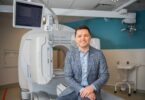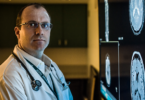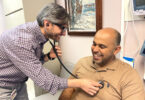Historically, women have faced barriers in the diagnosis, treatment and care of many health conditions. This year for International Women’s Day, we’re highlighting the extraordinary contributions female-identifying researchers and physicians at Sunnybrook are making to bridge gaps and advance women’s health research and care.
Expanding the treatment options for uterine fibroids
Uterine fibroids are a common but potentially debilitating gynecological condition. Approximately 70% of women develop them before the age of 50. They are typically benign tumors that develop inside the wall of the uterus and can cause heavy menstrual bleeding, infertility and severe pain. Traditional treatment options include surgical treatments such as hysterectomy and myomectomy but these often require longer recovery times and can be quite invasive.
Dr. Elizabeth David, an interventional radiologist and affiliate scientist in the Odette Cancer Program, recently led a successful clinical trial, exploring the use of non-invasive MRI-guided focused ultrasound (FUS) for the ablation of uterine fibroids. Following the success of the trial, the device developed by Arrayus Technologies Inc., a Sunnybrook Research Institute spin-off company, received Health Canada Approval.
The Arrayus FUS system uses high-precision acoustic energy to precisely target and treat tissue deep within the body while protecting nearby tissue, without the need for incisions or general anesthesia. This research and technology are paving the way for Canadian health-care providers to offer a safe, non-invasive alternative to traditional surgical options thereby giving women with fibroids more treatment options and hopefully improving their quality of life.
Bridging gaps in stroke research and care
In the fall of 2024, a research team led by Dr. Amy Yu, neurologist and senior scientist in the Hurvitz Brain Sciences Program, was awarded $5M from the Heart & Stroke Foundation, Canadian Institutes of Health Research (CIHR) and Brain Canada Foundation for its work improving stroke care, treatment and recovery for women.
Every year, more than 30,000 women in Canada experience a stroke, and despite this prevalence, gaps in awareness, research, diagnosis, and care threaten women’s heart and brain health.
The pan-Canadian initiative, Stroke in Women: Growing Opportunities to Realize optimal Evaluation, Diagnosis, and outcomes, or StrokeGoRed, is the first formal research network in Canada dedicated to studying stroke in women. The interprofessional group aims to advance knowledge on how and why stroke affects women differently and provide mentorship to the next generation of stroke researchers and clinicians.
Personalized support for young patients with breast cancer
Sunnybrook is home to PYNK, the first program of its kind in Canada, designed to support Sunnybrook patients who are newly diagnosed with breast cancer at age 40 or younger.
Doctors are seeing a rise in breast cancer rates among young women in their 20s, 30s and 40s, and while women under 40 make up a small amount of all breast cancer patients, they have unique physical, psychological and social care needs. Young patients with breast cancer are more likely to experience fertility concerns, social isolation, financial and career-related distress, and difficulties caring for young children, among other hardships as a result from their cancer diagnosis and treatment.
The PYNK program provides patients and their families with a continuum of support from the time of referral through treatment and follow-up. PYNK educates patients about their breast cancer diagnosis and the impact of treatment, empowering them to make informed decisions about their care. PYNK also helps patients navigate a complex medical system involving multiple specialists, such as plastic surgeons and oncofertility experts.
PYNK offers professional and peer psychosocial support, as well as resources on nutrition, exercise, and hair preservation options like cold capping and wigs. Patients also have access to specialized support for their children, including age-appropriate books about a parent’s cancer experience, childcare resources, and a child life specialist who can provide in-home therapy sessions.
The PYNK program bridges gaps that young women may face during their cancer journey, and can help those recovering get back to a “new normal” life, including returning to work or dealing with long-term effects of treatment.
Championing endometriosis diagnosis and care
Endometriosis, affecting approximately 10 percent of patients with a uterus, occurs when tissue similar to the lining of the uterus grows outside of the uterus, which often results in pain or infertility. On average, patients wait 9-10 years to be diagnosed with the condition, delaying appropriate care and impacting their quality of life.
Dr. Jamie Kroft, an obstetrician gynaecologist in the DAN Women & Babies Program specializes in minimally invasive surgery, and cares for patients who have lived with endometriosis for years without a proper diagnosis, which can end up impacting other major organs, like the kidneys, GI tract or lungs.
Dr. Kroft is working closely with other specialists in the GTA to form a central intake clinic for patients with endometriosis. Her advocacy is helping women in the GTA gain access to first consult sooner, advancing earlier diagnosis, treatment and pain management of their endometriosis and ultimately improving quality of life.








